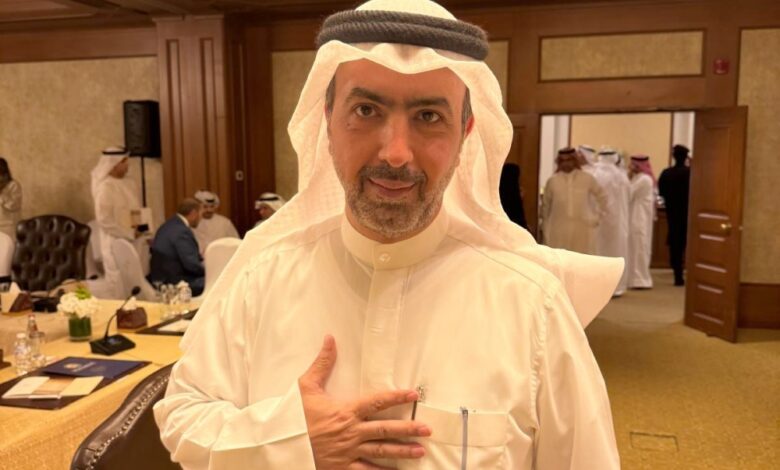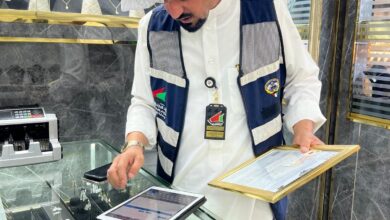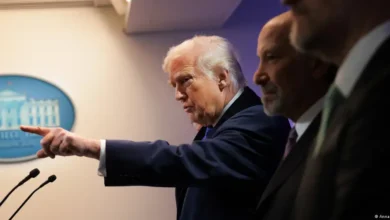GCC Emergency head calls for stronger ties with IAEA to tackle regional crises
Brigadier General Dr. Rashed Mohammed Al Marri, Director of the GCC Emergency Management Center in Kuwait, said that the center aims to strengthen the region’s capabilities to respond to any emergency, whether radiological or nuclear.

• The GCC Emergency Management Center, alongside the IAEA, met with Gulf emergency representatives to coordinate joint exercises over the next three years, completing the Gulf emergency project in collaboration with Atomic Energy.
Brigadier General Dr. Rashed Mohammed Al Marri, Director of the Gulf Cooperation Council (GCC) Emergency Management Center in Kuwait, emphasized the need to strengthen cooperation between Gulf emergency organizations and the International Atomic Energy Agency (IAEA) to effectively address regional emergencies, including radiological and nuclear incidents, as reported by Al Jarida newspaper.
Al-Marri told the newspaper that the Emergency Center in the GCC countries aims to strengthen the region’s capabilities to respond to any emergency, whether radiological or nuclear. This is the core role of the Emergency Center: to prepare and qualify Gulf national teams to effectively handle any nuclear or radiological emergency.
He stressed that the Emergency Center has met with emergency representatives from the Gulf countries, in the presence of the IAEA. These meetings, held through the General Secretariat of the GCC and the IAEA, focused on coordinating joint Gulf exercises over the next three years to complete the Gulf emergency project in collaboration with ‘Atomic Energy.’
This project is set to conclude in 2027, with various workshops and training sessions aimed at preparing Gulf teams for the best response through the Emergency Center, creating competent Gulf personnel capable of successfully managing all types of emergencies.
He added that the joint Gulf exercises are designed to enhance the scientific, technical, and operational capabilities of Gulf teams to respond to any emergency. If an issue or emergency arises, there will be proactive solutions and preparations in place.
Al-Marri emphasized that the Emergency Center plays a key role in coordinating efforts across the GCC countries, developing studies, and offering effective solutions for regional events and emergencies. The goal is to anticipate problems before they occur, create a roadmap for solutions, and activate early warning systems, as time is critical during emergencies.
In such situations, emergency teams may not be able to respond immediately, so proactive measures are the key to addressing any emergency effectively. These measures provide solutions for future emergencies through strategic planning that contributes to mitigating their impact.
Al-Marri concluded, “With the combined efforts of the GCC countries and ‘Atomic Energy,’ we are prepared to respond to any emergency or event, and the GCC countries have long completed their plans to face any forthcoming challenges.”
Al-Marri added that “The Emergency Center is responsible for contributing to the identification and assessment of natural and non-natural risks in the GCC countries, as well as the risks whose effects may be prolonged by any of the GCC States. It also proposes scientific and practical solutions to reduce these risks and mitigate their effects, receives urgent reports on emergency situations, and issues alerts and warnings based on available data. These reports are then shared with the member states.”
“The center also develops policies and procedures to coordinate relief efforts between the GCC countries, prepares guidance manuals on how to develop emergency management plans at the national level, and creates procedures for confronting and addressing emergencies,” he said.
He continued that “The Emergency Center seeks to contribute to the development of plans, programs, and projects for emergency management. It provides technical support, advisory services, and other forms of assistance to the GCC countries, coordinates human and automatic support efforts among the GCC States, and supports joint efforts for countries affected by disasters.”
“Additionally, the centre works to standardize the technical specifications of emergency control equipment, mechanisms, and tools, and provides technical assistance to member states in this regard. The Center also aims to standardize terms and concepts related to emergency management, build databases of local and international experts, and identify mechanisms to benefit from their expertise. Furthermore, it analyzes and disseminates lessons learned from regional and international emergencies,” Al-Marri said.
He said that “The Emergency Center relies on establishing a point of contact in each GCC country to integrate national centers responsible for emergency forecasting and early warning, and to coordinate among them. It also builds relationships with international forecasting centers related to the center’s tasks and objectives, benefiting from their services according to the regulations governing this in the member states.”
Al-Marri said “the center coordinates with regional and international organizations to benefit from their scientific, technical, and training expertise, supports scientific research and environmental studies, and organizes conferences and workshops on emergency management in the GCC countries. It proposes rehabilitation and training programs, and coordinates with regional and international organizations to implement training for competent authorities in emergency management. Additionally, the center works to promote awareness of emergencies among citizens and residents.”
He revealed that the tasks of the center are summarized as preparing plans, programs, and strategies to ensure the effective implementation of the center’s objectives. These include developing general plans for managing various types of disasters, drawing on international expertise and experiences, conducting self-assessments of risks that may affect the center’s operations, evaluating available capabilities to address them, working to enhance these capabilities, and contributing to risk analysis studies in the GCC States in coordination with the relevant authorities.
The center also prepares and proposes scientific studies and research projects aligned with its objectives, coordinates with the national committees of the GCC States, provides scientific and technical consultations to the Board of Directors, and prepares periodic reports on its activities.
Additionally, the center drafts technical, administrative, financial, and organizational rules and regulations, follows up on their implementation once adopted, prepares the center’s annual budget, and monitors its implementation, as well as follows up on and implements the decisions of the Board of Directors.












